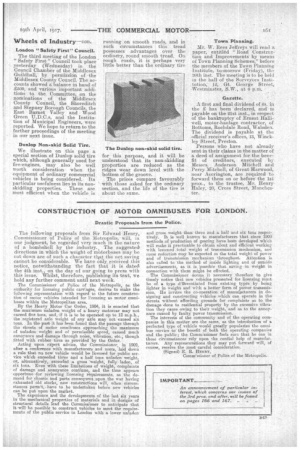CONSTRUCTION OF MOTOR OMNIBUSES FOR LONDON.
Page 11

If you've noticed an error in this article please click here to report it so we can fix it.
Drastic Proposals from the Police.
The following proposals from Sir Edward Henry, Commissioner of Poliee of the Metropolis, • will, in our judgment, be regarded very much in the nature of a bombshell by the industry. The suggested) directions in which the weight of motorbuses may be cut down are of such a character t4at the net saving cannot be considerable. We have only received this notice, notwithstanding the fact that it is dated the 4th inst. on the day of our going to press with this issue. 'Whilst, therefore, publishing its text, we hold any further comment until next week.
The Commissioner of Police of the Metropolis, as the authority for licensing public carriages, desires to make the
• following representation with regard to the future construction of motor vehicles intended for licensing as motor omnibuses within the Metropolitan area.
By the Heavy Motor Car Order, 1904, it is enacted -that the maximum unladen weight of a heavy motorcar may not exceed five tons, and, if it is to be operated up to 12 m.p.h., the registered axle weight of any axle may not exceed six tona. In the-past it has been found that the passage through the streets of motor omnibuses approaching the maximum of -unladen weight and of permissible speed, caused much annoyance and damage through noise, vibration, etc., though fitted with rubber tires as provided by the Order. Acting upon expert advice, the Commissioner, in 1909, after a conference with Manufacturers and users, laid down a rule that no new vehicle would be licensed for public service which exceeded three and a half tons unladen weight, or, -alternatively, exceeded a gross weight, fully laden, of aix tons. Even with these limitations of -weight, complaints • of damage and annoyance continue, and the time appears opportune -for reviewing licensing requirements, as the demand for .chassis and parts consequent upon the war having exhausted old stocks, new constructions will, when circurnatances permit,, have to be undertaken before new vehicles can be put upon the market.
The experience and the developments of the la-st six years in the mechanical properties of materials and in designs of structural details lead the Commissioner to anticipate that it will be possible to construct vehicles to meet the requirements of the public service in London with a lower unladen
mid gross weight than three and a half and six tons respectively. It is well known to manufacturers that since 1909 methods of production of gearing have been developed which will make it practicable to obtain silent and' efficient working with lessened .total weight of transmission mechanism, and some reduction may be expected in the total weight of power and of transmission mechanism throughout. Attention is also called to .the method of inthde lighting and of outside advertisementS, as it is. Possible that saving in weight in connection with them might be effected.
The Commissioner deems it necessary -thawfore to give timely notice that new vehicles presented for licensing mustbe of a type differentiated from existing typis by being lighter in weight m.o. with a ;better form of power transmission. He invite.s the co-operation of manufacturers in designing and constructing vehicles which can operate in the streets without affording grounds for complaints as to the damage done to residential property by the excessive vibration they cause owing to their weight, and as to the annoymice caused by faulty power transmission. The interests of the community and of-the operating companies in this matter are -the same, as the introduction of a perfected type of vehicle would greatly popularize the omnibus service tothe benefit of both the operating companies and the public ; the Commissioner feels sure that lie can in these circumstances rely upon the cordial help of manufacturers. Any representations they may put forward will, of course, receive the most careful consideration. (Signed) E. R. HENRY,
Conardssioner of Police of the Metropolis.






















